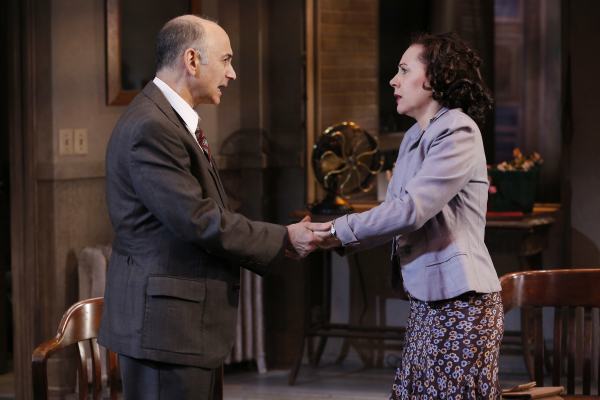Rocket to the Moon

(© Carol Rosegg)
Rocket to the Moon is rarely performed these days. This is a pity, because the 1938 drama about infidelity and unrealized dreams might just be Clifford Odets' greatest play. Sadly, that's hard to see in the Peccadillo Theater Company's revival at Theatre at St. Clement's. While there are glimmers of a timeless American drama in this production, its voice seems mostly trapped in the past.
Dr. Ben Stark (Ned Eisenberg) has a modest dental practice in midtown Manhattan. He feels frustrated that he's not moving ahead in life. His wealthy father-in-law Mr. Prince (Jonathan Hadary) offers him the money to open a specialized office uptown, but his wife, Belle (Marilyn Matarrese), thinks he should stay put. She believes he could be more successful if he just stopped letting others take advantage of him, like his down-on-his-luck officemate Dr. Cooper (Larry Bull), who hasn't paid rent in months. Belle also thinks her husband should be tougher on his young new receptionist, Cleo Singer (Katie McClellan). Cleo takes extended lunch breaks and refuses to wear stockings in the office. But when Ben starts to think of Cleo as more than just a receptionist, things get complicated, especially as he has to vie for her attention with his own father-in-law and wolfish choreographer Willy Wax (Lou Liberatore). Everyone loves Cleo…except, of course, Mrs. Ben Stark.
Matarrese plays the jilted wife like a wounded animal. Her words are her claws, poised to shred anyone who threatens the life she's created. Appropriate to his wishy-washy character, Eisenberg feels like a leaf blown by the forceful winds all around him. McClellan convincingly portrays the ingenue, making up for a troubled home life with fantastical lies about her family's wealth and privilege. Director Dan Wackerman makes her lack of power in this world terrifying and real. Throughout the play, she is brutalized (verbally and physically) by men. Disappointingly, a desperately thigh-slappy late monologue meant to convey her newfound agency does the exact opposite. Hadary has the strongest handle on Odets-speak, rattling off the droll musings of the old philosopher-capitalist as if they were his own.
New York accents set to stun, everyone in the ensemble digs into Odets' (occasionally overwrought) language, and the effect is somewhat like watching a great old movie. "Kiss me, love me — kiss me till I can't be kissed no more. Hold me, don't let me be alone in the world, Ben…Don't let me be alone," Cleo exclaims as a sad jazz saxophone swells over the scene (sound design by David Thomas). Sure, we might classify it as melodrama today, but with the lights and sound and costumes of yesteryear, it's a lot of fun to see and hear.
Set designer Harry Feiner authentically imagines the 12th-floor midtown office, complete with windows facing other windows. The waiting room is occupied by uncomfortable-looking wooden furniture and sturdy metal fans, indicating a sweltering summer in the city. That's not enough to keep these buttoned-up New Yorkers from wearing three-piece suits and a dizzying array of neckties (costumes by Amy C. Bradshaw). Only Mr. Prince is really dressed for the season: With his light cotton suit and bushy whiskers, he looks like Brooklyn's answer to Colonel Sanders. No one did "casual" back then. Unfortunately, our persistent awareness of Rocket as a period piece has the effect of distancing us from its themes.
In her program note, Odets biographer Beth Phillips contends that Rocket "reflects the terror of both 1938 and 2015." In considering the similarities of those two years (persistent economic despair, a turn toward radical political ideology, the looming threat of global conflict), it is easy to see the relevance of Rocket to today. Spare a few clues that Odets planted in the script (casual mentions of the WPA and "The Japs"), however, we're given very little sense of the world beyond the office before us. Wackerman has not brought the context of 1938, with its impossibly high stakes, into the room. Even Dr. Cooper's fiery Odetsian invective ("What is the Congress doing? Where are they in the hour of the needs of the people?") seems like a non sequitur, made even more irrelevant by Larry Bull's muddled delivery.
While many will undoubtedly be impressed by the visual cohesion and committed performances, few will walk away acutely feeling Odets' message of human potential stifled under the oppressive yoke of capitalism. More a museum piece than a vital evergreen drama, this Rocket fails to launch.











